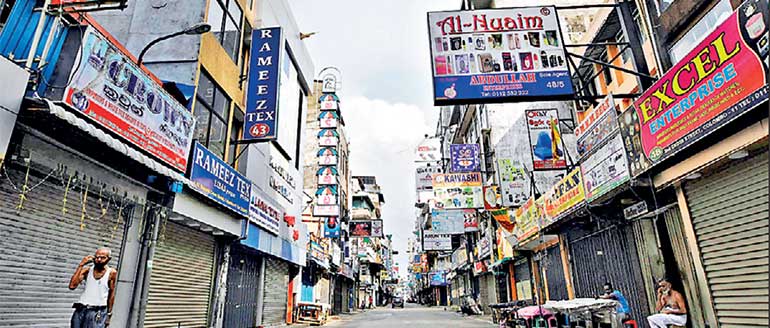Sunday Apr 20, 2025
Sunday Apr 20, 2025
Monday, 17 October 2022 04:36 - - {{hitsCtrl.values.hits}}

 From food insecurity and lack of services, to limited or no economic opportunities, millions of Sri Lankans are facing acute risks and deprivations – Pic by Shehan Gunasekara
From food insecurity and lack of services, to limited or no economic opportunities, millions of Sri Lankans are facing acute risks and deprivations – Pic by Shehan Gunasekara
Sri Lanka was on its way to eliminating extreme poverty until the COVID-19 pandemic and the recent economic crisis threw the country into disarray. Between 2006 and 2016, extreme poverty—measured by the number of people living on less than $ 2.15 a day—had fallen from 11% to 1.3%, lifting almost 2 million people out of severe deprivation.
But today, ordinary Sri Lankans all over the country—from farm workers, tuk-tuk drivers, street vendors to public sector workers and business owners—face extraordinary challenges to make ends meet. This economic crisis has eroded decades of progress, with the country experiencing its highest poverty rate since 2009.
As we observe the International Day for the Eradication of Poverty – or ‘End Poverty Day’ –, we recognise the daily adversity millions of Sri Lankans face.
The current economic crisis has hit Sri Lankan families hard on multiple fronts. Inflation has increased the cost of essential goods and services for all, particularly for the poor—the food and essential items that the poor could afford with Rs. 100 before the crisis, now cost as much as Rs. 166 ($ 1 = Rs. 360).
The economic contraction has also led to widespread losses in jobs, economic activity, and declines in labour incomes. An estimated half a million jobs were lost between 2021 and 2022 in industry and services. Those who continue to be employed in these sectors can expect a 15% decline in their real incomes.
The Government responded with expanded coverage of temporary cash transfer programs to more than 1 million more beneficiaries and provided top-up transfers to offset inflation, tripling the monthly government spending on cash transfers. However, in the face of such a widespread shock and the weaknesses in the social safety net system, the current safety net has not been able to fully cushion the impact on people’s incomes. As a result, poverty levels (measured by the World Bank’s $ 3.65 international poverty line in 2017 Purchasing Power Parity terms) are estimated to have doubled, from 13.1% in 2021 to 25.6% in 2022. This corresponds to roughly 2.7 million additional people falling into poverty within the span of one year. While 80% of the poor still live in rural areas, urban poverty rates have tripled to 15%. In addition, more than half the population living in estate areas is now below the poverty line. This is an immense setback.
But in every crisis, there is an opportunity that cannot be wasted. For all of us working in Sri Lanka, this crisis is an opportunity to commit to and implement a solid and credible fiscal and structural reform program to get the country back on a sustainable and inclusive growth path.
Reforms are needed to address significant imbalances and put the country on a sustainable fiscal and debt trajectory to avoid deepening the current crisis. These reforms must identify avenues to increase government revenues in three ways. First, improve spending efficiency to deliver critical services and programs and keep people out of poverty and vulnerability. Second, enhance transparency and debt management. And third, reduce the footprint of the public sector in commercial activities and reverse the anti-export bias of trade policies.
But deep reforms do not come without tradeoffs. And at this time, more than any other, we must protect people from worsening welfare conditions. As part of broader structural reforms, social assistance must be revamped to meet the needs of not only those who are poor today, but also of those who are vulnerable to falling into poverty tomorrow. The ‘Leave no one behind’ initiative launched by the
Government in close coordination with the Welfare Benefits Board (WBB), is a commendable effort to improve welfare targeting to those most in need. During my recent visit I heard many stories of resilience of Sri Lankan people who are helping one another and together navigating an uncertain future. Community kitchens, distribution of nutrition packs and support to access essential needs such as medicines are just some of the initiatives World Bank Group staff are engaged in on a voluntary basis.
From food insecurity and lack of services, to limited or no economic opportunities, millions of Sri Lankans are facing acute risks and deprivations. If their needs and circumstances are not addressed, more people will be at risk of falling into poverty.
Sri Lanka’s track record of eliminating extreme poverty proves that the country has the tools to get this done. And its greatest asset – the strength and resilience of the Sri Lankan people – can get this beautiful country back on the path of prosperity.
But the road ahead will not be easy. The World Bank is a long-term partner to the people and Government of Sri Lanka, and we are committed to work closely with the Government on this critical, complex, and much-needed reform agenda.
(The writer is the World Bank Country Director for Maldives, Nepal and Sri Lanka.)